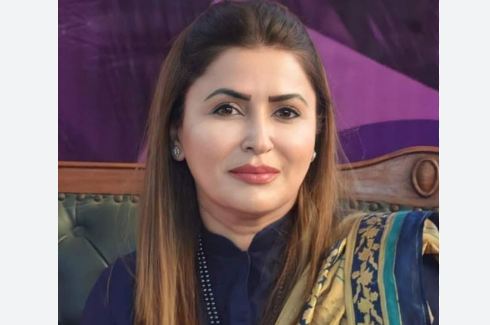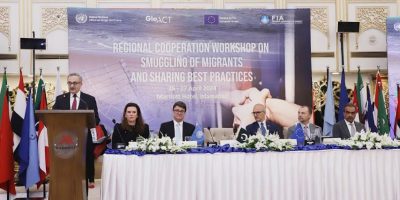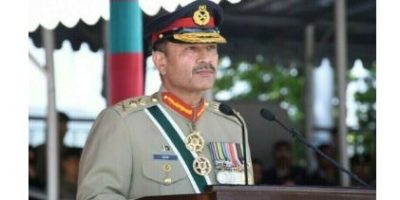Joint efforts of federal, provincial govts and int’l agencies essential for financial uplift of poor: Shazia Marri

DNA
ISLAMABAD, MAY 10: Shazia Marri, Federal Minister for Poverty Alleviation and Social Safety (PA&SS), Chairperson Benazir Income Support Programme (BISP) said joint and concerted efforts of all stakeholder including Federal Government, provincial governments, and international development partners are vital for financial uplifting of the poor and under privileged household in Pakistan. She stated this while speaking at concluding session of first ever three-days National Social Protection Conference in Murree on Wednesday.
The Minister said that Benazir Income Support Programme (BISP), through its direct cash transfer initiative – Benazir Kafaalat – is currently supporting over 9 million household living below the poverty line. She, however, noted with concern that there was still a large number who were facing economic hardship and eagerly looking towards the government to tsupport them.
Federal Minister Ms. Shazia Marri said that the Benazir Income Support Program is proud to be the largest social safety program in the country. Over the past 15 years, the program has learned a lot and achieved a lot. She said that for this success, we are extremely grateful to our development partners, that showed their interest on a continuous basis for the welfare and stability of this institution.
Chairperson BISP, Ms. Marri further said that it is the responsibility of the government to help the poor people of the country. For the economic takecare larger part of deserving people, it is important that all the federal and provincial institutions should formulate such policies which can ensure support to the poor and underprivileged. We have been able to achieve good results through mutual consultation and better utilization of available resources, she continued.
She further noted that it is imperative to provide social safety to all the deserving people of the country. To achieve this goal, there is a need to create a system under which all social safety programs and initiatives can be integrated. “The outcome of this conference will provide guidelines in which direction we have to work further”, she noted and said, “dialogue held at the Social Safety Conference should continue in the future as well”. She suggested the establishment of a consultative forum between BISP and all stakeholders to consolidate the efforts of all Federal and provincial governments and international institutions for the welfare of underprivileged segments of the society.
The Minister informed the participants that recently under the Benazir Income Support Program, the start of education and health related programs for the people of Balochistan has been approved, which is a great news for the people of Balochistan. She said that there is a need to invest in human capital development. We need to adopt international best practices and plans to deal with social safety and economic crises caused by natural disasters. Federal Minister Ms. Shazia Marri expressed her gratitude to the participants of the conference, especially GIZ, for creating such an opportunity to share thoughts and experience.
Earlier, Ms. Shazia Marri taking part in the debate session, said that for the first time in Pakistan, Shaheed Zulfiqar Ali Bhutto gave “Roti, Kapra aor Makkaan” to every citizen, and Benazir Income Support Program is also a continuation of the same. She urged the experts and responsible officers from the provinces that by taking advantage of this conference, to devise such a system at the provincial level that can ensure rapid assistance to the people in emergency situations.
On the third and last day of the conference, the representatives of international institutions, high-level officials and experts of the federal and provincial governments shared their view to discuss how government institutions can extend timely assistance to the affected people during crises situation caused by climate change or any other emergency. In the first session, UNICEF’s Deputy Country Director in Pakistan, Anutha Kabor, mentioned last year’s disastrous floods and gave suggestions for the protection of affected people, particularly children and pregnant and lactating women, in such situations. On this occasion, Gul Najam Jami of World Bank, Ali Shehzad of PSPA, Secretary BISP Yusuf Khan and others also presented various interventions. To provide social security to the people suffering from difficulties in emergency situations, the United Nation ILO’s representative Ms. Rabia Razak gave a presentation on the role of various institution and development partners. World Food Organization’s Tahir Nawaz also offered suggestions to ensure food supply in emergency situations.
Addressing the session titled Future of Dynamic Registry of Social Protection, BISP Board Member Haris Ghazdar said that it is the responsibility of governments to provide assistance to the needy people in emergency situations, World Bank representatives at the conference Philip Leyte and Muzaffar Ali, Miss Johanna of GZ, Ms Shireen Mustafa Secretary Social Welfare Sindh, Naveed Akbar, DG National Dynamic Registry of Benazir Income Support Programme, Mr. Noor Rehman DG (CT), BISP others also participated in various sessions of the conference.
At the conclusion statement of the 1st National Social Protection Conference was also issued.
STATEMENT OF THE 1ST NATIONAL SOCIAL PROTECTION CONFERENCE
1. Federal programs should be designed and implemented in consultation with provincial entities. For this purpose, it is recommended to form a Coordination Committee for consultation and collaboration in designing new projects/programs, finetuning currently running projects/programs, planning and implementing activities along the delivery chain, e.g. targeting methods, payment systems, IT systems, logistic support etc., and follow up on action points of the conference. Provinces / Federating Units may also seek federal input and support in designing and implementing their own programs.
a. The Coordination Committee shall comprise representatives of federal, provincial governments and development partners.
b. The Committee shall meet once every quarter or more frequently if needed.
2. The Federal Government will explore the possibilities of removal of duplications with the provincial programs.
3. There is consensus on developing mechanisms of two-way exchange on reciprocal basis for different data sources, including social/beneficiary registries, climate-related and administrative data, designating focal agencies, and making institutional arrangements for developing exchange protocols for maintaining security and privacy of data.
4. Update of NSER may also be carried out jointly and both Provincial/Federating Units and Federal Governments may explore cost/resource-sharing mechanisms leading to common ownership of the data.
5. The possibility of using BISP field / provincial offices may be explored for provision of services being provided by the Federal and Provincial/Federating Units Governments. Services may include registration for programs, complaint management, and targeting. The concept of One Window Centers may be introduced to provide all services under one roof.
6. Provinces/Federating Units may extend administrative support in jointly implementing activities such as providing campsites for making payment distribution, registration of affected populations, etc.
7. In case of any disasters, partners will collaborate and engage with disaster management entities at Federal and Provincial/Federating Units level to come up with a joint plan to address the needs of people affected by the disaster.
8. Partners shall further explore the option of partnerships across programs, including co-financing. Programs in areas where joint financing and delivery may be more efficient (e.g. in the case of insurance schemes or schemes where benefits spill over across multiple provinces, such as interventions related to climate change and disasters), federal-provincial partnership will be explored.
Related News

UNODC, Pakistan join hands to combat smuggling of migrants
ISLAMABAD, APR 26 /DNA/ – The Federal Investigation Agency (FIA) and the Ministry of ForeignRead More

Complete independence impossible without economic stability: COAS
RAWALPINDI, APR 26: Chief of Army Staff (COAS) General Asim Munir on Friday said thatRead More


Comments are Closed